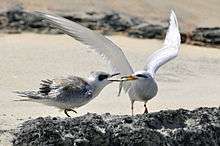Snowy-crowned tern
The snowy-crowned tern (Sterna trudeaui), also known as Trudeau's tern, is a species of tern in the family Laridae. It is found in Argentina, south-east Brazil, Chile, Paraguay and Uruguay, and as a vagrant in the Falkland Islands. The tern's natural habitats are swamps, shallow seas, and intertidal marshes. The species was first described by the American ornithologist John James Audubon in 1838. He had been sent a specimen by his friend Dr James de Berty Trudeau (1817–1887) of Louisiana, who had found several of the terns at Great Egg Harbor Bay, New Jersey. Audubon named the bird in his honour.[2]
| Snowy-crowned tern | |
|---|---|
 | |
| Adult feeding a juvenile in Rio Grande do Sul, Brazil | |
| Scientific classification | |
| Kingdom: | Animalia |
| Phylum: | Chordata |
| Class: | Aves |
| Order: | Charadriiformes |
| Family: | Laridae |
| Genus: | Sterna |
| Species: | S. trudeaui |
| Binomial name | |
| Sterna trudeaui Audubon, 1838 | |
Description
The adult snowy-crowned tern has a moderate-sized head and a slender body. It reaches a length of about 16 in (41 cm). The bill is slender, flattened, slightly down-curved and about the same length as the head. It is black with a yellow tip, a yellow edging to the mandibles and a yellow base to the lower mandible. The iris is brown. Around and behind the eye is a slatey-grey patch, the rest of the head being white. The upper-parts and underparts are light bluish-grey, apart from the axilliaries, rump and tail-coverts, which are white. The wings are long, slender and pointed, sometimes with a little black on the wing-tips, and the tail is deeply forked. The feet are orangish-yellow. The call is a series of rapid notes "je-je-je-je", or a harsh "jeeer".[2][3]
Distribution
Trudeau's tern is resident in the southern half of South America. It breeds in Uruguay, Brazil, Argentina and Chile and migrates in winter further north along the coast to Rio de Janeiro in the east and southern Peru in the west. It is a vagrant to the Falkland Islands and Paraguay,[1] and the birds Audubon described from New Jersey were far outside the normal range.
References
- BirdLife International (2012). "Sterna trudeaui". IUCN Red List of Threatened Species. 2012: e.T22694651A38875552. doi:10.2305/IUCN.UK.2012-1.RLTS.T22694651A38875552.en.
- Audubon, John James (1844). The Birds of America. J.J. Audubon. pp. 105–106.
- Schulenberg, Thomas S.; Stotz, Douglas F.; Lane, Daniel F.; O'Neill, John P.; Parker, Theodore A. III (2010). Birds of Peru. Princeton University Press. p. 154. ISBN 1-4008-3449-X.
